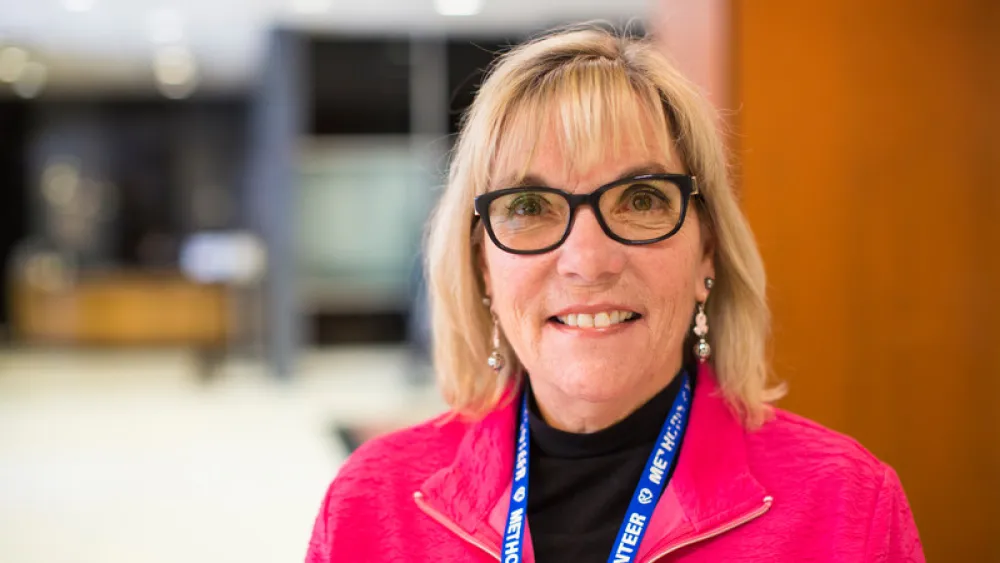Healthy Lifestyle
Volunteering Helps Others and Your Own Health


Cancer survivors sharing the journey
A breast cancer diagnosis 26 years ago both saved and changed Dianna Hite’s life.
“I was 33 years old,” said Dianna, “and without my Methodist surgeon going above and beyond, I wouldn’t be sitting here today.”
During Dianna’s treatment involving surgery, chemotherapy and reconstruction, a volunteer walked into her hospital room and shared her own experience with breast cancer. That fellow survivor and mentor had a big impact on her life, and made her realize how important it was to share in the journey.
Living is giving
As she made a full recovery, Dianna made a promise to herself: she would dedicate her life to giving back to fellow survivors and making her community a better place. She currently volunteers for at least six different organizations, including the Methodist Estabrook Cancer Center Breast Care Center, the American Cancer Society and Carter Lake Fire and Rescue. At 60 years old and retired, Dianna shows no sign of slowing down.
“I volunteer because I’m lucky to have a second chance,” said Dianna. "My motto is living is giving. That’s what I do and I love it.”
Besides just fueling her passion, Dianna says volunteering keeps her young.
“My husband and I both have an active lifestyle,” said Dianna. “You’ve got to keep moving. You’ve got to keep active. The more you move the better you feel, too. I encourage people to get out there and do things to help the community. Be a part of it. Make it better.”
Essential for healthy aging
From socialization to exercise, volunteering is good for both mental and physical health. Senior health experts like Dr. Rebecca Reilly, medical director of the Methodist Hospital Geriatric Evaluation and Management Clinic, say it’s essential.
“Exercise and socialization are really important to stay healthy as you age, and they are things you don’t need a prescription to do,” said Dr. Reilly. “Whatever your health status is, do something to be active. If you’re over 65, being active 15 minutes or more a day improves the circulation to your brain and improves brain function.
Exercise and brain health
According to recent research, exercise affects brain health in many ways:
- It increases your heart rate, pumping more oxygen to the brain
- It releases hormones which stimulate the growth of brain cells
- It stimulates the growth of new connections between brain cells
- It boosts cell growth in the hippocampus, an area of the brain responsible for memory and learning
- It has an antidepressant-like effect, associated with a drop in stress hormones
Making connections
“We have volunteers who say coming in just helps them get up and going in the morning. It gives them a reason to get out of the house and do something active,” said Linda Rajcevich, Director of Patient and Guest Services for Methodist Hospital and Methodist Women’s Hospital. “Socialization is really a great benefit of volunteering. Our volunteers many times have lunch together, they grow and become friends and get to know each other and their families and become parts of their lives.”
“Socialization, talking with other people is also very good for brain cells. There are all kinds of studies that show people who have more social connections do better, and live longer, healthier and happier. If you are not interacting with other people it’s bad for the cognitive part of your brain, the memory and thinking. It’s also bad for your mood.”
Dr. Rebecca Reilly
Director, Methodist Hospital GEM Clinic
Social interaction fuels cognitive sharpness
Many studies have shown that social interaction is a key ingredient to maintaining long-term cognitive sharpness. Not having social support from friends and family can even lead to chronic depression.
“The social aspect is really a great benefit of volunteering,” said Rajcevich, who says more than 700 people ages 14 to 99 volunteer at Methodist. “We create opportunities to socialize and say thank you to our volunteers each year, and they look forward to seeing other volunteers and friends they don’t often get to connect with. It’s a camaraderie and a family in a way.”
And for Dianna, those connections fuel a passion that keeps her both healthy and happy.
“Over the course of 26 years, I have mentored probably more than 500 or 600 patients,” said Dianna. “When I run into someone I met 25 years ago who tells me, ‘You helped me through my breast cancer diagnosis,’ it's a great feeling.”

